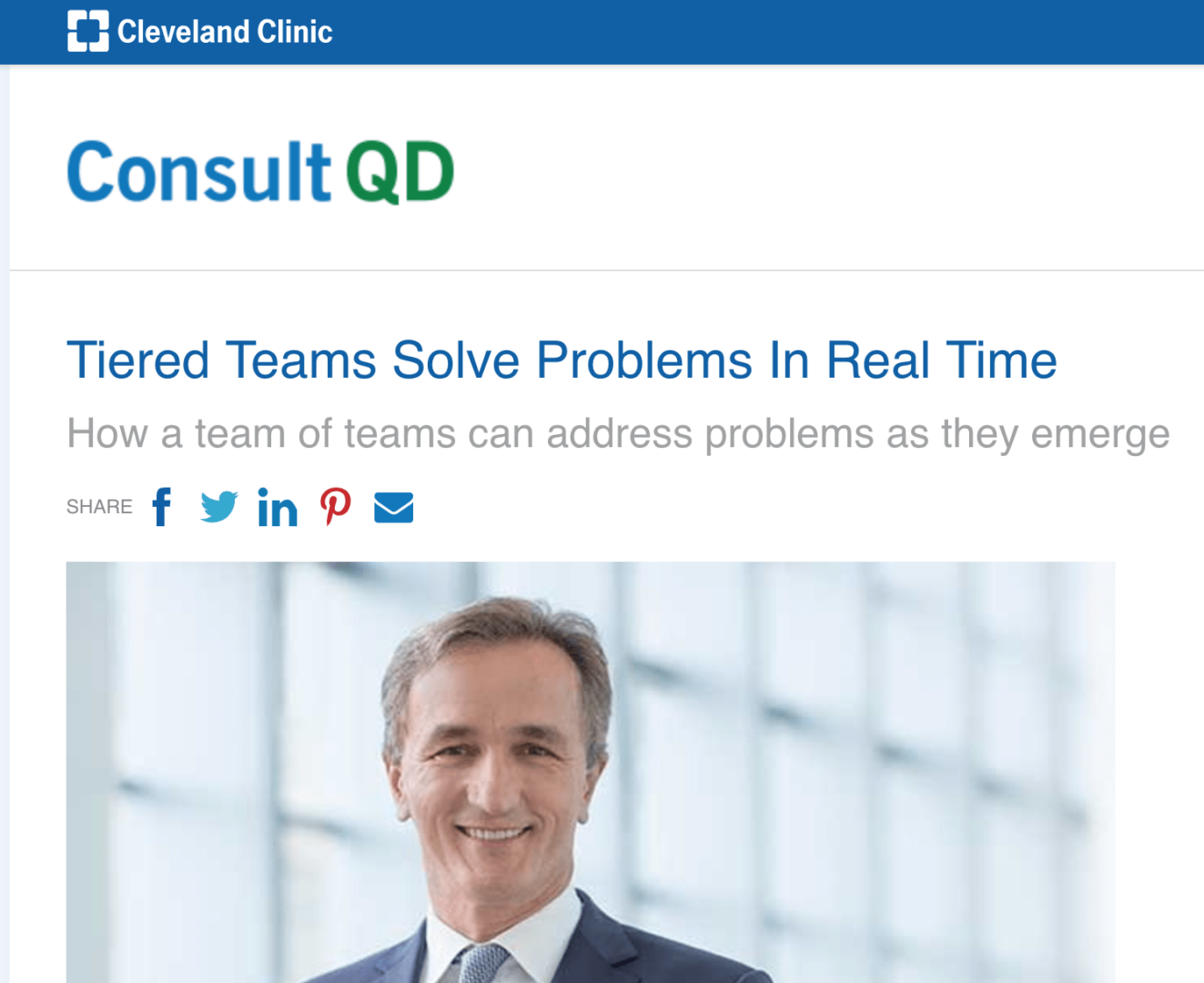Tomislav Mihaljevic, MD was named CEO of the Cleveland Clinic just over a year ago, replacing long-time CEO Toby Cosgrove, MD.
As I've blogged about (and podcasted about), I've been impressed with the Cleveland Clinic Improvement Model and their approach to continuous improvement, problem solving, and Lean management.
Dr. Mihaljevic has written a blog post about the power of “tiered huddles”:
“At Cleveland Clinic, we manage this barrage [problems that are flying at you] through a method called tiered huddles.”
He continues;
“Tiered huddles solve problems in real time. They help us deal with today's problems today, making our organization a better place to be a patient and a better place to work. Tiered huddles are one way we are working to create a culture where every caregiver is capable, empowered and expected to make improvements every day.“
I've been around healthcare organizations where, before Lean, the barrage of problems is sadly overwhelming. Without the mechanisms for communication and problem solving, it's too easy for leaders to just shrug and move on when problems are discovered (and that's not to mention what doesn't happen with the problems that are hidden or undisclosed). I'm not blaming staff or leaders for any of that situation or their behaviors… they are the product of a system.
I've seen cases where a nurse mentions a serious problem that led to patient harm to a manager. Everybody is sad for a moment… they wish it hadn't happened, but they don't take actions to learn from the problem so they can implement countermeasures that prevent future problems.
To their credit, Cleveland Clinic (and others) are trying to equip people to do better.
This includes creating a culture where “problems are treasure” (as Pascal Dennis and other former Toyota people say). People need mechanisms to speak up and, when possible, solve problems locally (which should happen most of the time) and to escalate problems when necessary (as an exception, not the norm).
I've seen some organizations err on the side of trying to escalate everything to senior leaders. That doesn't work because senior leaders have limited time and they're often too disconnected from the actual work to have helpful and effective solutions. There's also a temptation to try to “empower” people, but responsibility for systemic problems can be delegated. As John Shook, also formerly of Toyota says, Lean is neither top down or bottom up… it's both.
Again, Cleveland Clinic is charting that similar path, dealing with problems “at the appropriate level.”
“But every team can't solve every problem. Some solutions require more authority or more help.”
Read his post for an explanation of the daily tiered huddles cycle.
They emphasize safety issues, quality problems, and other things that can affect “patients and processes.”
As Dr. Mihaljevic says, it's about replacing a “culture of fear” with “a climate of teamwork and shared responsibility.”
I'm glad he shared this perspective and endorsement of this practice. What are your experiences with this approach, whether you're just getting started or have more experience with this approach? What works well? What have been your challenges?
See below for more on this topic…
Previous Blog Posts and Podcast:
Great White Paper: “No More Projects” (or “More Than Projects”)
Cleveland Clinic Improvement Model, Part 1: Alignment & Visual Management
Cleveland Clinic Improvement Model, Part 2: Problem Solving & Standardization
Another Podcast on the Topic
Tiered huddles were also a practice at Scott & White Health System, as I discussed here with two now-former Scott & White leaders:
Podcast #226 – Steve Hoeft and Dr. Bob Pryor, “The Power of Ideas to Transform Healthcare”
Thanks for checking this out…
What do you think? Please scroll down (or click) to post a comment. Or please share the post with your thoughts on LinkedIn – and follow me or connect with me there.
Did you like this post? Make sure you don't miss a post or podcast — Subscribe to get notified about posts via email daily or weekly.
Check out my latest book, The Mistakes That Make Us: Cultivating a Culture of Learning and Innovation:











Thanks, Mark! The implementation of Tiered Daily Huddles has really helped us accelerate improvement across our organization. Once we made the commitment, we rapidly looked to learn from others and begin rapid experiments with vigorous PDCA cycles. In mid-March we proposed the construct to our execs, on April 30 we had our first “Tier 6” huddle led by the CEO, and by end of May we had implemented them at all levels across 10 hospitals in NE Ohio including our main campus. We are grateful to several organizations and individuals who helped us learn and improve – including Intermountain, Toyota, and the Lean Enterprise Institute. We learned from others, we are happy to help others learn from us!
Thanks for sharing the additional context, Lisa!